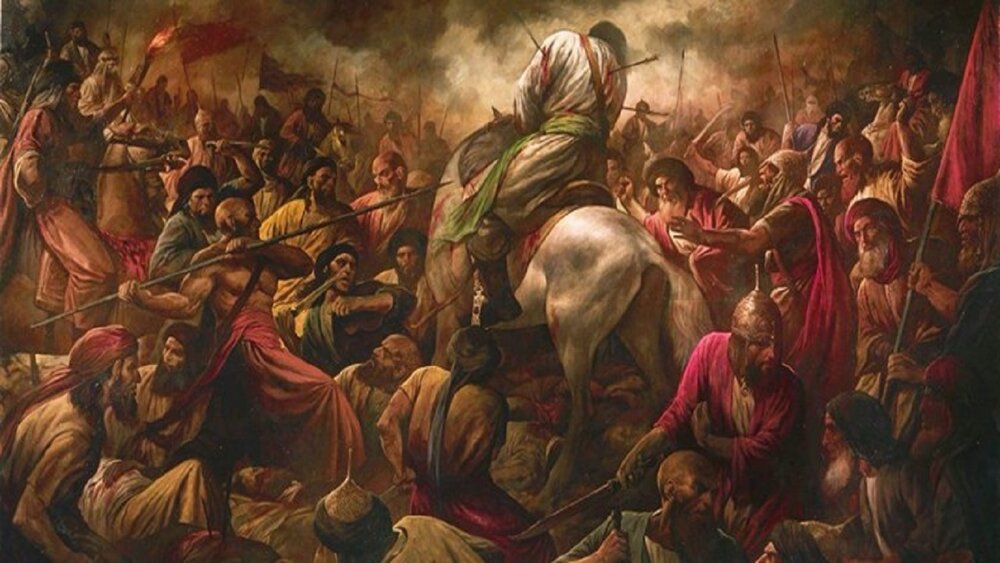Ashura uprising is epitome of sacrifice and solidarity

TEHRAN- Commemorating the martyrdom of Imam Hussein (AS) has played a major role in strengthening the solidarity and the spirit of making sacrifices in the history of the Islamic Republic of Iran, a religion expert tells the Tehran Times.
“The great epic of Ashura has a lot of messages and lessons that affect various dimensions of our political, social, and individual life. It played a major role in terms of making sacrifices and promoting altruism,” Hassan Qaemi, a religion expert, told the Tehran Times.
The expert further explained, “The philosophy and the goal of the genesis of humankind are to worship God. The Holy Quran states, ‘I have not created mankind and jinn except to worship me.’ If we want to worship God, and if we want to achieve the goal of the genesis of humankind, then we should take into account two very important factors: paying attention to God and Akhirah (the afterlife). And if we strengthen our belief in God and Akhirah, we will be able to be a friend of God, which is the goal of the genesis. To this end, we need to follow in an imam’s footsteps. The imam plays a major role in leading us to God and Akhirah. Paying attention to God and Akhirah was on full display on the day of Ashura.”
Imam Hussein (AS) is the third imam of the Twelve Imams, who was martyred in the Battle of Karbala on October 10, 680 (Muharram 10, 61 AH). His uprising against the Umayyad Caliph, Yazid ibn Mu'awiya, is widely seen as a revolution against corruption and oppression. The imam was the grandson of the Prophet Mohammad and his heartbreaking martyrdom sent shock waves through the Muslim world. The outcry over the martyrdom of Imam Hussein was so widespread that even Yazid, the killer of the imam, sought to whitewash his crime by blaming his commanders for the martyrdom of Imam Hussein (AS).
“In Karbala, Imam Hussein (AS) was an epitome of worshiping God. If it had not been for the uprising of Imam Hussein, the issue of worshiping God would have been ended. Moreover, the imam fully demonstrated the spirit of altruism and making sacrifices,” Qaemi said, adding that Imam Hussein has endured a lot of sufferings for the sake of God, which immortalized him in the eyes of millions of people around the world.
According to the expert, Iran has learned many lessons from the Ashura uprising especially during Iraq’s war against Iran in the 1980s, which is also known as the Holy Defense, and the war against ISIS in recent years.
“The spirit of making sacrifices and altruism was strikingly remarkable in the fight against ISIS and Takfiri groups. The Iranian fighters were truly ready to make sacrifices to fight against ISIS. And this martyrdom-seeking spirit of devotion is not instilled in the traditional classes at universities or schools, rather it is being instilled into them at the mourning ceremonies for the martyrdom of Imam Hussein (AS),” Qaemi asserted.
He also said all the sacrifices General Qassem Soleimani and other Iranian martyrs made were inspired by Imam Hussein’s uprising.
“Our martyrs and their families have learned lessons from [the Battle of] Karbala,” Qaemi pointed out.
Qaemi elaborated on how the Ashura uprising contributed to the promotion of altruism and devotion during the 8-year war between Iran and Iraq. However, he said that Ashura continued to impact the daily life in Iran even after the war ended.
In Qaemi’s view, Ashura’s impact on Iran is reflected in the people’s solidarity with each other in hard times. According to the expert, the Ashura uprising can be a pattern of giving a helping hand in times of difficulties.
Social solidarity has become an utmost necessity in Iran, given the U.S. economic pressures on the country. The U.S. unilaterally withdrew from the 2015 nuclear deal, officially known as the Joint Comprehensive Plan of Action (JCPOA) on May 8, 2018, re-imposing sweeping economic sanctions on Iran, a move that exacerbated economic woes and created hardships for the ordinary people.
“Today, our Jihad is economic and self-reliance Jihad. Today’s Jihad means that we should pursue the resistance economy, and help the poor, who have fallen on hard times due to the sanctions. This requires an Ahsura spirit.” Qaemi said.
Leave a Comment